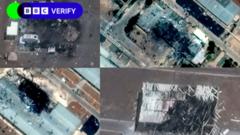The International Atomic Energy Agency (IAEA) revealed that no new damage has occurred to Iran’s nuclear facilities following recent Israeli attacks, spurring renewed international scrutiny and condemnation.
**Nuclear Tensions Rise as IAEA Reports No Further Damage to Iran's Facilities**

**Nuclear Tensions Rise as IAEA Reports No Further Damage to Iran's Facilities**
Global watchdog assesses the aftermath of Israeli airstrikes on Iran's nuclear sites, marking rising geopolitical tensions in the region.
The International Atomic Energy Agency (IAEA) Director General Rafael Grossi addressed member states in Vienna, confirming that there has been no additional damage to Iran's nuclear infrastructure since Israel's strikes on Friday. The primary target was the Natanz uranium enrichment plant, where Grossi noted that while an above-ground enrichment facility was destroyed, the underground components appeared intact. Despite the attack, the radioactivity around Natanz remains within normal ranges.
Grossi's briefing indicated that the recent Israeli military actions aimed to halt Iran's alleged nuclear weaponization efforts. The IAEA documented damage to four buildings at Iran's Isfahan Nuclear Technology Centre, including a uranium conversion plant, but observed no harm to the underground Fordo facility or the Khondab heavy water reactor under construction.
Iran has consistently maintained that its nuclear program is peaceful, urging the IAEA's board of governors to rebuke Israel's military aggression. Tensions escalated as Iranian officials declared the strikes a blatant violation of international law and signaled their missile strikes on Israel as a retaliatory measure. The fallout from these clashes has claimed over 220 lives in Iran and 24 in Israel since the conflict reignited.
The IAEA's recent findings follow a declaration made by its board which officially categorized Iran as breaching its nuclear non-proliferation obligations for the first time in two decades. This declaration emphasizes Tehran's failure to fully disclose its nuclear activities, particularly post the U.S. withdrawal from the nuclear agreement in 2018. Iran's advancements in uranium enrichment have raised alarms, with the agency estimating Iran possesses sufficient 60%-enriched uranium for up to nine nuclear weapons.
Israel remains adamant in its commitment to dismantling Iran's nuclear capabilities, reinforcing military strategies to counter what it perceives as an existential threat. As the situation unfolds, international diplomatic efforts may be necessary to prevent further escalation and secure peace in the volatile region.
Grossi's briefing indicated that the recent Israeli military actions aimed to halt Iran's alleged nuclear weaponization efforts. The IAEA documented damage to four buildings at Iran's Isfahan Nuclear Technology Centre, including a uranium conversion plant, but observed no harm to the underground Fordo facility or the Khondab heavy water reactor under construction.
Iran has consistently maintained that its nuclear program is peaceful, urging the IAEA's board of governors to rebuke Israel's military aggression. Tensions escalated as Iranian officials declared the strikes a blatant violation of international law and signaled their missile strikes on Israel as a retaliatory measure. The fallout from these clashes has claimed over 220 lives in Iran and 24 in Israel since the conflict reignited.
The IAEA's recent findings follow a declaration made by its board which officially categorized Iran as breaching its nuclear non-proliferation obligations for the first time in two decades. This declaration emphasizes Tehran's failure to fully disclose its nuclear activities, particularly post the U.S. withdrawal from the nuclear agreement in 2018. Iran's advancements in uranium enrichment have raised alarms, with the agency estimating Iran possesses sufficient 60%-enriched uranium for up to nine nuclear weapons.
Israel remains adamant in its commitment to dismantling Iran's nuclear capabilities, reinforcing military strategies to counter what it perceives as an existential threat. As the situation unfolds, international diplomatic efforts may be necessary to prevent further escalation and secure peace in the volatile region.























